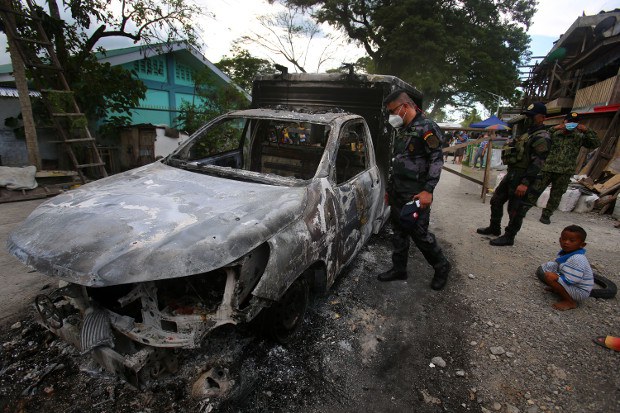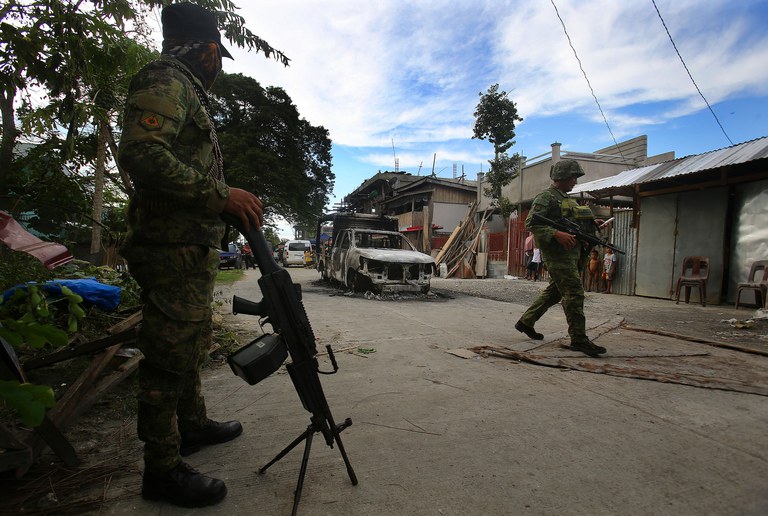Philippines: Chief of Autonomous Muslim Region Says he Needs More Transition Time
2020.12.04
Datu Piang, Philippines
 Murad Ebrahim, chairman of the Moro Islamic Liberation Front guerrilla group, gives a speech in Cotabato, Philippines, in October 2012.
Murad Ebrahim, chairman of the Moro Islamic Liberation Front guerrilla group, gives a speech in Cotabato, Philippines, in October 2012.
The transition head of an autonomous Muslim region in the southern Philippines said Friday that he would need his term extended to put in place reforms required before local voters elect their own government in 2022.
The coronavirus pandemic and ongoing threats from Islamic State-linked militant groups in the south have slowed the reform process, Murad Ebrahim, head of the Bangsamoro Transition Authority, said in a phone interview.
Murad said he had recently asked President Rodrigo Duterte for an extension of his term by three years, to 2025. Meanwhile, earlier this week, Esmael Mangudadatu, a Muslim congressman, filed a bill seeking to amend a law to allow extending Murad’s term.
“Initially, we wanted six years [of transition] but the Moro Islamic Liberation Front had agreed to a compromise of three years. However, we see that time as very short,” Murad told BenarNews, referring to negotiations that ended the front’s decades-long armed separatist campaign and led to the creation of the Bangsamoro Autonomous Region in Muslim Mindanao (BARMM).
Murad heads the transitional local government in five provinces and a handful of districts that make up the autonomous region.
Since taking power in February 2019, the transitional government has put in place a full working government, an administrative code to guide the 4,000 employees, initiated some development in the area as well as brought relative peace, Murad said.
“Due to COVID, the implementation [of reforms] has slowed down. We could not implement certain agreements that we had committed to,” Murad said.

IS-linked militants stall reforms
Meanwhile, Islamic State threats have stalled a major reform goal – decommissioning the weapons of the former Moro Islamic Liberation Front guerrillas, said Murad, the former chief of MILF.
The group used to be the largest of guerrilla organizations fighting for a separate Muslim state in Catholic Philippines since 1978. It later dropped its demand for an independent state, and settled for expanded autonomy.
In February last year, these guerrillas, led by Murad, formally assumed leadership of the autonomous Muslim region.
The phased handover of weapons is part of the peace deal with the government that led to the establishment of BARMM. Each combatant who hands over weapons is expected to receive a cash payment, including money for education.
Currently, 12,000 firearms, or about 30 percent of the estimated 40,000 such arms said to be held by MILF members, have been turned over and destroyed, Murad said.
He’s certain the remaining 70 percent “will be decommissioned in the next two years.”
The decommissioning process has been slow because the former guerrillas are reluctant to give up their weapons amid ongoing threats and attacks from Islamic State-linked militants, as well as from disgruntled groups that broke away from MILF, Murad said.
“The violence has gone down, but there are many groups here that have splintered. Here in mainland Mindanao, we have the BIFF,” Murad said, referring to the Bangsamoro Islamic Freedom Fighters.
BIFF is known for audacious attacks on law enforcement.
On Thursday night, its militants torched a police car in Datu Piang, a town in Maguindanao province, causing panic among residents. The militants were thwarted after a brief exchange of gunfire with the police.
On Friday, BIFF spokesman Abu Jihad said the group attacked police vehicles in Datu Piang because it believed police were involved in illegal activities in the town.
“The law of Islam prohibits all wrongdoings…we are just enforcing it,” Jihad said over local radio. “We will not stop and no one can stop us until there are illegal activities in the town.”

Meanwhile on Basilan and Jolo islands, former Moro Islamic Liberation Front guerrillas are already helping the police go after militants with the Abu Sayyaf Group, which is divided into several factions, Murad said.
“In the island provinces you have the Abu Sayyaf Group. But the ASG appears to have lost its central leadership, and we don’t know now who the real leader is,” Murad said.
A pro-Islamic State (IS) faction of Abu Sayyaf has been blamed for plotting deadly bombings over the past two years. The latest attack, in August, left 15 dead and more than 75 wounded in Jolo.
“We are also starting to reach out to them, to try to convince them,” to give up fighting, Murad said.
Froilan Gallardo contributed to this report from Cagayan de Oro, southern Philippines.







